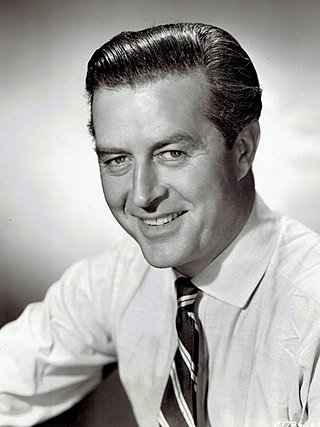
Ray Milland was a Welsh-American actor and film director. He is often remembered for his portrayal of an alcoholic writer in Billy Wilder's The Lost Weekend (1945), which won him Best Actor at Cannes, a Golden Globe Award, and ultimately an Academy Award—the first such accolades for any Welsh actor.

The Harvey Girls is a 1946 Technicolor American musical film produced by Arthur Freed for Metro-Goldwyn-Mayer. It is based on the 1942 novel of the same name by Samuel Hopkins Adams, about Fred Harvey's Harvey House waitresses. Directed by George Sidney, the film stars Judy Garland and features John Hodiak, Ray Bolger, and Angela Lansbury, as well as Preston Foster, Virginia O'Brien, Kenny Baker, Marjorie Main and Chill Wills. Future star Cyd Charisse appears in her first speaking role on film.
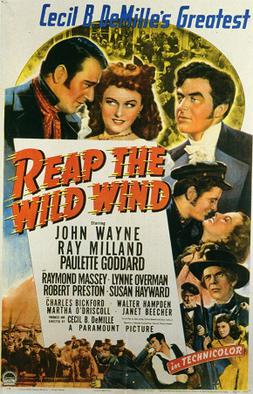
Reap the Wild Wind is a 1942 American adventure film produced and directed by Cecil B. DeMille and starring Ray Milland, John Wayne, and Paulette Goddard, with a supporting cast featuring Raymond Massey, Robert Preston, Lynne Overman, Susan Hayward and Charles Bickford. DeMille's second Technicolor production, the film is based on a serialized story written by Thelma Strabel in 1940 for The Saturday Evening Post. The screenplay was written by Alan Le May, Charles Bennett, Jesse Lasky, Jr. and Jeanie MacPherson.
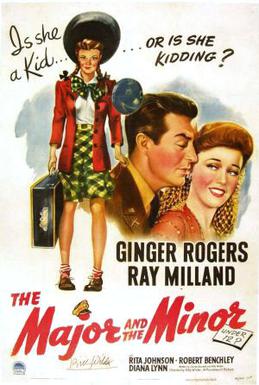
The Major and the Minor is a 1942 American romantic comedy film starring Ginger Rogers and Ray Milland. It was the first American film directed by Billy Wilder. The screenplay credited to Wilder and Charles Brackett is "suggested by" the 1923 play Connie Goes Home by Edward Childs Carpenter, based on the 1921 Saturday Evening Post story "Sunny Goes Home" by Fannie Kilbourne.

Henry Stephenson was a British actor. He generally portrayed amiable and wise gentlemen in many films of the 1930s and 1940s. Among his roles were Sir Joseph Banks in Mutiny on the Bounty (1935) and Mr. Brownlow in Oliver Twist (1948).
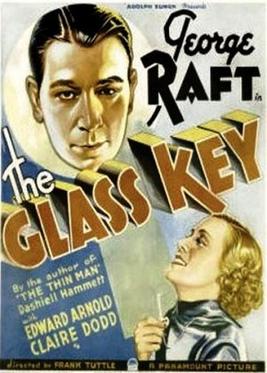
The Glass Key is a 1935 American crime drama film directed by Frank Tuttle starring George Raft, Edward Arnold, Claire Dodd, Guinn "Big Boy" Williams and Ray Milland. Ann Sheridan has a brief speaking role as Raft's character's nurse in their first film together. Produced and distributed by Paramount Pictures, it was based upon the 1931 suspense novel The Glass Key by Dashiell Hammett,

We're Not Dressing is a 1934 pre-Code screwball musical comedy film directed by Norman Taurog and starring Bing Crosby, Carole Lombard, George Burns, Gracie Allen and Ethel Merman. Based on the 1902 J. M. Barrie play The Admirable Crichton, the film is about a beautiful yacht owner (Lombard) who becomes stranded on an island with her socialite friends, a wacky husband-and-wife research team and a singing sailor (Crosby). The supporting cast features Leon Errol and Ray Milland.

Variety Girl is a 1947 American musical comedy film directed by George Marshall and starring Mary Hatcher, Olga San Juan, DeForest Kelley, Frank Ferguson, Glenn Tryon, Nella Walker, Torben Meyer, Jack Norton, and William Demarest. It was produced by Paramount Pictures. Numerous Paramount contract players and directors make cameos or perform songs, with particularly large amounts of screen time featuring Bing Crosby and Bob Hope. Among many others, the studio contract players include Gary Cooper, Alan Ladd, Paulette Goddard, Ray Milland, William Holden, Burt Lancaster, Robert Preston, Veronica Lake, William Bendix, Barbara Stanwyck and Paula Raymond.

The Good Father is a 1985 British film directed by Mike Newell and starring Anthony Hopkins, Jim Broadbent, Harriet Walter, Fanny Viner, Simon Callow, Joanne Whalley, and Michael Byrne. It is loosely based on Peter Prince's 1983 novel of the same name. It marked the first credited appearance in a feature film of Stephen Fry. The film was produced for British television but received a theatrical release in the US.
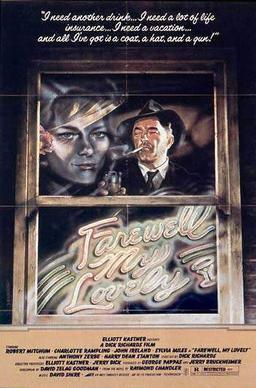
Farewell, My Lovely is a 1975 American neo-noir crime thriller film directed by Dick Richards and featuring Robert Mitchum as private detective Philip Marlowe. The picture is based on Raymond Chandler's novel Farewell, My Lovely (1940), which had previously been adapted for film as Murder, My Sweet in 1944. The supporting cast features Charlotte Rampling, John Ireland, Jack O'Halloran, Sylvia Miles, Harry Dean Stanton, Joe Spinell, Sylvester Stallone and hardcore crime novelist Jim Thompson, in his only acting role, as Charlotte Rampling's character's elderly husband Judge Grayle. Mitchum returned to the role of Marlowe three years later in the 1978 film The Big Sleep, making him the only actor to portray the character more than once in a feature film.
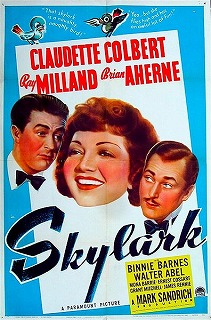
Skylark is a 1941 American comedy film directed by Mark Sandrich and starring Claudette Colbert, Ray Milland and Brian Aherne. It was produced and distributed by Paramount Pictures. Film historian James H. Farmer described Skylark as "light-hearted fluff" with the story of a woman on her fifth wedding anniversary, realizing that she is fed up with always coming in second to her husband's advertising business. Just at that moment, she meets a handsome attorney, and their innocent flirtation begins to turn into something more serious.
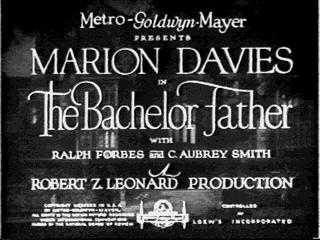
The Bachelor Father is a 1931 American pre-Code MGM comedy drama film directed by Robert Z. Leonard and starring Marion Davies and featuring Ralph Forbes, C. Aubrey Smith, Ray Milland and Guinn "Big Boy" Williams. It was based on a same-titled play by Edward Childs Carpenter, with Smith re-creating his role from the Broadway production. The plot centers around a stuffy British nobleman whose three grown children suddenly arrive at his estate and decide to move in with him.
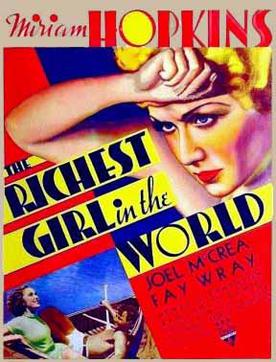
The Richest Girl in the World is a 1934 American romantic comedy film directed by William A. Seiter and starring Miriam Hopkins, Joel McCrea and Fay Wray. Norman Krasna was nominated for the Academy Award for Best Story. It was remade in 1944 as Bride by Mistake with Laraine Day and Alan Marshal.
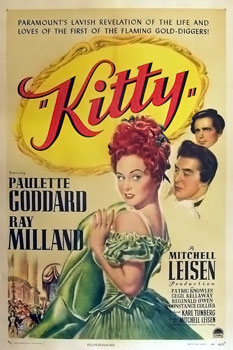
Kitty is a 1945 film, a costume drama set in London during the 1780s, directed by Mitchell Leisen, based on the novel of the same name by Rosamond Marshall. The screenplay is by Karl Tunberg. It stars Paulette Goddard, Ray Milland, Constance Collier, Patric Knowles, Reginald Owen, and Cecil Kellaway as the English painter Thomas Gainsborough.
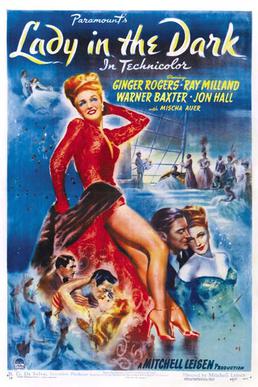
Lady in the Dark is a 1944 American musical film directed by Mitchell Leisen, from a screenplay by Frances Goodrich and Albert Hackett that is based on the 1941 musical of the same name by Moss Hart. The film stars Ginger Rogers as a magazine editor, who although successful, finds herself on the edge of a breakdown while juggling her feelings for three prospective suitors, played by Ray Milland, Warner Baxter, and Jon Hall.

The Girl in the Red Velvet Swing is a 1955 American film directed by Richard Fleischer from a screenplay by Walter Reisch and Charles Brackett, and starring Joan Collins, Ray Milland, and Farley Granger. The CinemaScope film was released by Twentieth Century Fox, which had originally planned to put Marilyn Monroe in the title role, and then suspended her when she refused to do the film.

So Evil My Love is a 1948 British and American Gothic psychological thriller film directed by Lewis Allen and starring Ray Milland, Ann Todd and Geraldine Fitzgerald.

A Woman of Distinction is a 1950 American screwball romantic comedy film directed by Edward Buzzell and starring Rosalind Russell, Ray Milland and Edmund Gwenn. It was produced and distributed by Columbia Pictures.

Night Into Morning is a 1951 American drama film directed by Fletcher Markle and starring Ray Milland, John Hodiak and Nancy Davis.



















